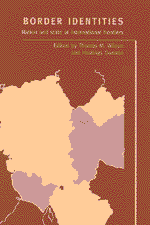Book contents
- Frontmatter
- Contents
- List of maps
- List of contributors
- Acknowledgements
- 1 Nation, state and identity at international borders
- 2 State formation and national identity in the Catalan borderlands during the eighteenth and nineteenth centuries
- 3 A western perspective on an eastern interpretation of where north meets south: Pyrenean borderland cultures
- 4 The ‘new immigration’ and the transformation of the European-African frontier
- 5 Transnationalism in California and Mexico at the end of empire
- 6 National identity on the frontier: Palestinians in the Israeli education system
- 7 Grenzregime (border regime): the Wall and its aftermath
- 8 Transcending the state? gender and borderline constructions of citizenship in Zimbabwe
- 9 Borders, boundaries, tradition and state on the Malaysian periphery
- 10 Markets, morality and modernity in north-east Turkey
- 11 Imagining ‘the South’: hybridity, heterotopias and Arabesk on the Turkish–Syrian border
- Author index
- Subject index
2 - State formation and national identity in the Catalan borderlands during the eighteenth and nineteenth centuries
Published online by Cambridge University Press: 02 December 2009
- Frontmatter
- Contents
- List of maps
- List of contributors
- Acknowledgements
- 1 Nation, state and identity at international borders
- 2 State formation and national identity in the Catalan borderlands during the eighteenth and nineteenth centuries
- 3 A western perspective on an eastern interpretation of where north meets south: Pyrenean borderland cultures
- 4 The ‘new immigration’ and the transformation of the European-African frontier
- 5 Transnationalism in California and Mexico at the end of empire
- 6 National identity on the frontier: Palestinians in the Israeli education system
- 7 Grenzregime (border regime): the Wall and its aftermath
- 8 Transcending the state? gender and borderline constructions of citizenship in Zimbabwe
- 9 Borders, boundaries, tradition and state on the Malaysian periphery
- 10 Markets, morality and modernity in north-east Turkey
- 11 Imagining ‘the South’: hybridity, heterotopias and Arabesk on the Turkish–Syrian border
- Author index
- Subject index
Summary
‘The history of the world can be best observed from the frontier’, wrote Pierre Vilar (1985: 23), the noted French historian of modern Catalonia and Spain. Vilar's claim is not without exaggeration, yet it underscores the critical if too-frequently ignored role of borderlands as both sites and metaphors in the political and cultural constructions of a modern world of nation-states. Indeed, the perspective from the periphery challenges much of the received wisdom common to both histories and anthropologies of contemporary national states.
According to an old but still vital historical paradigm, modern nations, especially those of the older, contiguous states of Western Europe, are frequently depicted as being built from political centres outward and imposed upon marginal groups and peripheral regions in a process of institutional integration and cultural assimilation (see, for example, Deutsch 1953, 1963; Macartney 1934; Bendix 1964). National identity, from this perspective, is the simultaneous expression of a cultural unity and a national consciousness which is the political oeuvre of the centralised state. France, in this view, is the paradigm of state and nation building, although in the past 100 years, succeeding generations of scholars have hotly contested the question of which was the formative period in the creation of French unity. Once Saint Louis was considered to have presided over the birth of the nation France, then it was Louis XIV, then the French Revolution.
- Type
- Chapter
- Information
- Border IdentitiesNation and State at International Frontiers, pp. 31 - 61Publisher: Cambridge University PressPrint publication year: 1998
- 10
- Cited by



